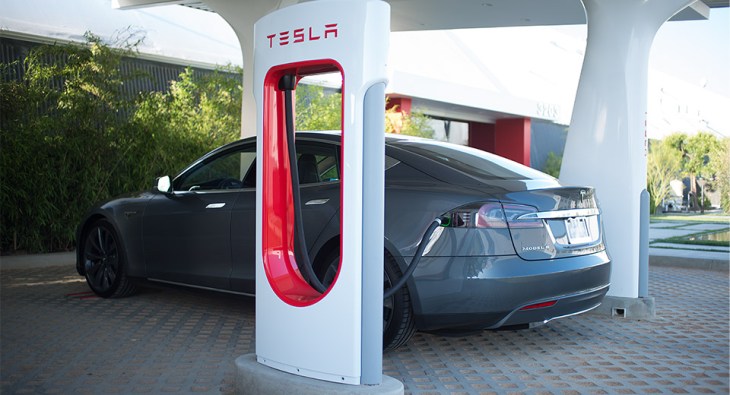Tesla issued a recall today on a power adapter that could have a defect that leads to shorting and even fire in some cases. The recall says that the NEMA 14-50 adapters used to charge Model S vehicles could exhibit higher than normal resistance when subject to corrosion, damage or fluctuating outputs of electrical sockets.
When the adapters encounter resistance, they heat up, which could lead to melting in the adapter’s casing, the socket or the cord. This, in turn, could result in electrical arcing and fire.
Interestingly, Tesla says that it will be able to “repair” the charging receptacle with an over-the-air software update. Most likely this will regulate voltage in a more aggressive manner to prevent the issues. In addition, it’s engineering a new 14-50 adapter that will contain a thermal fuse, which will add in a physical cutoff if the charger gets too hot.
Which makes this an interesting recall in that nothing is actually being “recalled.” The over-the-air update apparently is enough to prevent the issue and then new adapters are being mailed out. Most vehicle recalls require that you take your car into a service center to get alterations made to it to fix a problem. Though there have been some cases of user-installable parts being sent out in the mail — I’ve had a couple of those.
Tesla CEO Elon Musk took to Twitter today to clarify that no actual Model S vehicles will be recalled — the power adapters are being modified and then re-issued and the over-the-air software update went out late last month. “The word “recall” needs to be recalled,” Musk said.
The New York Times piece on this recall mentions a garage fire involving a Tesla vehicle that occurred late last year, implying that it has something to do with this recall. But then later in the piece it includes a statement from a Tesla spokesperson: “based on our inspection of the site, the car and the logs, we know that this was absolutely not the car, the battery or the charge electronics.”
Update: Tesla has clarified that the incident involving the garage fire indicated that the building’s wiring could have caused the problem:
“While the number of incidents remains small, and Tesla’s review to date points to the building receptacle or wiring as the primary cause of failed NEMA 14-50 adapters, the Company has determined that a voluntary recall is appropriate as a precautionary measure.”
Tesla estimates that some 2.7% of those 29k adapters could contain the defect, but it’s issuing a recall anyway.
Recalls are a way of life for automobile manufacturers, which review incidents of damage or issues caused by features on a regular basis and issue notices. I’ve received several for seatbelts and other components on vehicles over the years.
But Tesla is a young company, and there have been several incidents (unrelated to charging) of cars getting in accidents on the road and catching fire. Musk has been aggressive in stating that gas cars have a worse record for safety, and that the accidents would have been more tragic if a gas-powered car was involved. And there have been no injuries or deaths recorded in conjunction with these fires.
Still, Tesla is fighting a perception problem because it garners just as much press from every accident or issue as it does for “saving” the electric car industry from the rubbish bin of history. Though Musk has been vocal in asking why Tesla gets so much scrutiny over accidents, one could easily point to the mountain of positive press it gets at other times to argue that the scales are relatively fairly balanced.
